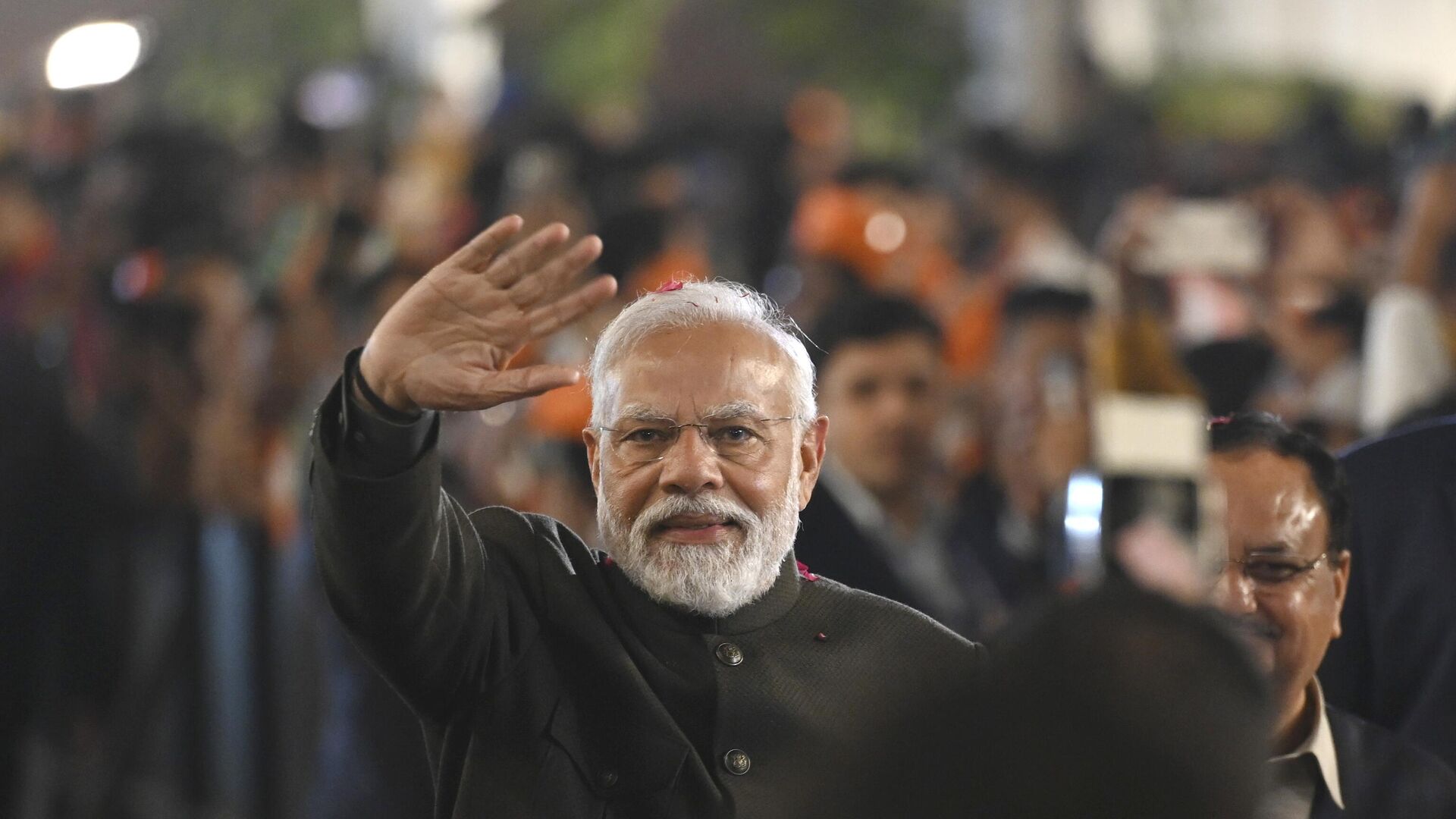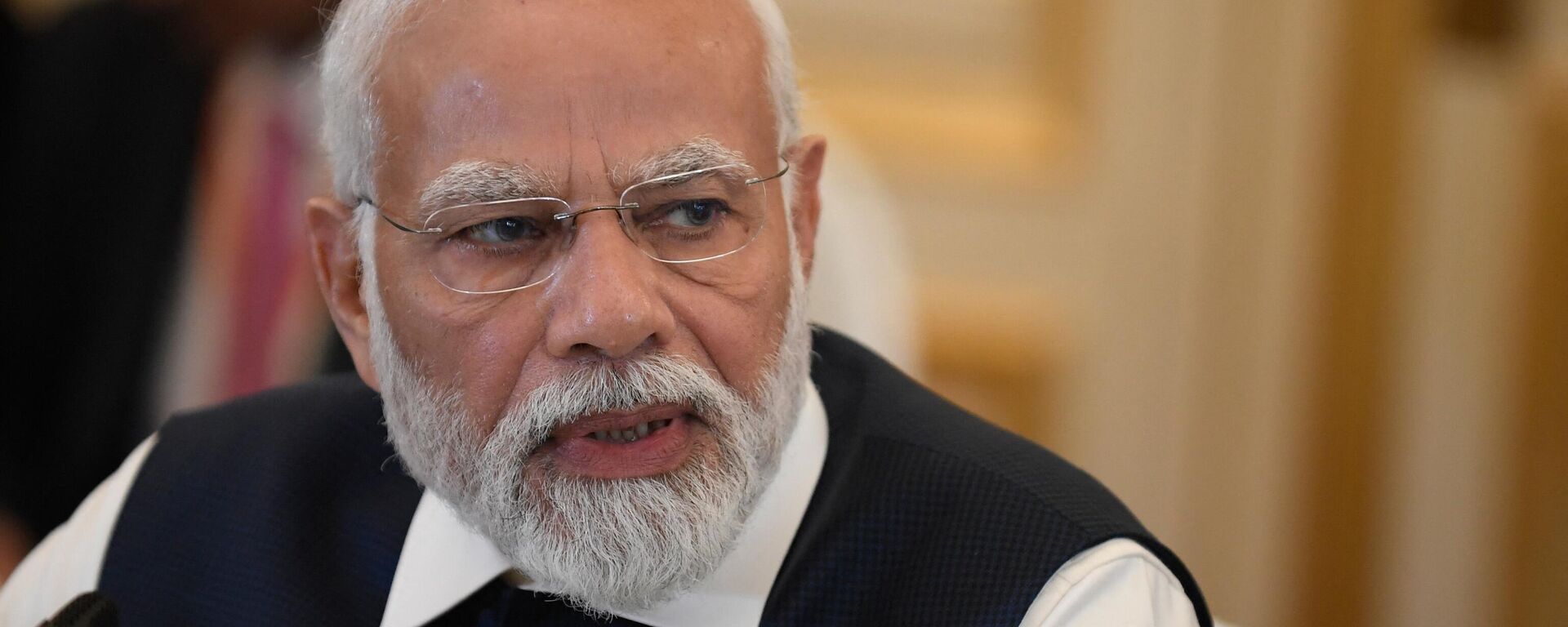https://sputniknews.in/20240122/old-habits-never-die-western-press-peddles-propaganda-in-run-up-to-indias-polls-6296650.html
Old Habits Never Die: Western Press Peddles Propaganda in Run Up to India's Polls
Old Habits Never Die: Western Press Peddles Propaganda in Run Up to India's Polls
Sputnik India
A recent article by British weekly newspaper The Economist shows that western media is jealous of India’s economic growth while keeping its culture intact. Sputnik India reached out to an expert to expose the propaganda.
2024-01-22T20:43+0530
2024-01-22T20:43+0530
2024-02-01T14:43+0530
sputnik opinion
india
delhi
new delhi
narendra modi
lord rama
ram temple
ayodhya
western sanctions
russia
https://cdn1.img.sputniknews.in/img/07e7/0c/06/5732324_0:160:3072:1888_1920x0_80_0_0_31b6addec2d9801740b52a69262443f2.jpg
As India’s economy continues to flourish despite the geopolitical spillovers, a section of the Western media seems to be getting frustrated. As such, the UK-based weekly newspaper The Economist targeted Prime Minister Narendra Modi over the consecration ceremony at the grand Ram Temple in one of its latest articles.Notably, The Economist has a long track record of poor predictions: for example, it had claimed Western sanctions would destroy the Russian economy. In reality, the Russian economy has been doing pretty much well, especially after new opportunities for trade have emerged in the East, while Western nations, on the contrary, continue to suffer from inflation.Western Media Resentful Over India’s GrowthIn the article titled “Narendra Modi’s Illiberalism May Imperil India’s Economic Progress”, the authors claim that while Modi’s vision of national greatness is about wealth as well as religion, the danger is that a swaggering “Hindu chauvinism” undermines his economic ambitions.The good thing is that the approach of such media outlets is now predictable, which adds no value even to their agenda, at least in India: the expert advises Western media to grasp the fact that Bharat is no longer under British rule or their influence: to be frank, India does not need any lectures on how it has to progress, culturally and economically.India Continues to Grow, Keeping Culture IntactThe Economist at the start of the article talks a lot about the Ayodhya Ram Temple, outlining the Babri Masjid incident of 1992.Sharing his thoughts about the views presented about the Ram Temple, the economist at BIPFP said that the funny thing is that the article first mentioned a quote from the Supreme Court ruling, and then in the following sentence, they mention the temple as controversial.He added that the newspaper deliberately hid the fact that the temple was built based on a Supreme Court judgment.“The building of a Ram Temple reflects the solid democratic fundamentals of the country, with which people's emotions and values resonate. People in India take motivation for cultural coherence from Lord Ram, which could be a lesson for the world under a continuous civilizational conflict.”Kumar opined that these agenda-based suggestions have long been influencing Indian economic policy at some point in the past, which now people have realised are irrelevant.
https://sputniknews.in/20231221/how-modi-used-ft-to-bust-western-narrative-and-reach-out-to-indian-diaspora-5920339.html
india
delhi
new delhi
ram temple
ayodhya
russia
Sputnik India
feedback.hindi@sputniknews.com
+74956456601
MIA „Rossiya Segodnya“
2024
Rahul Trivedi
https://cdn1.img.sputniknews.in/img/07e6/0c/13/136500_0:0:628:627_100x100_80_0_0_72097ff894c7446b70d2efafcb719720.jpg
Rahul Trivedi
https://cdn1.img.sputniknews.in/img/07e6/0c/13/136500_0:0:628:627_100x100_80_0_0_72097ff894c7446b70d2efafcb719720.jpg
News
en_IN
Sputnik India
feedback.hindi@sputniknews.com
+74956456601
MIA „Rossiya Segodnya“
Sputnik India
feedback.hindi@sputniknews.com
+74956456601
MIA „Rossiya Segodnya“
Rahul Trivedi
https://cdn1.img.sputniknews.in/img/07e6/0c/13/136500_0:0:628:627_100x100_80_0_0_72097ff894c7446b70d2efafcb719720.jpg
western propaganda, the economist, ram temple in ayodhya, pran pratishtha at ram temple, pran pratishtha of ram lalla, india's economic growth, world's fastest growing economy, supreme court judgement on ram temple, babri masjid, anti-hindu agenda of west, west against russia, western propaganda against russia
western propaganda, the economist, ram temple in ayodhya, pran pratishtha at ram temple, pran pratishtha of ram lalla, india's economic growth, world's fastest growing economy, supreme court judgement on ram temple, babri masjid, anti-hindu agenda of west, west against russia, western propaganda against russia
Old Habits Never Die: Western Press Peddles Propaganda in Run Up to India's Polls
20:43 22.01.2024 (Updated: 14:43 01.02.2024) A recent article by the British weekly newspaper The Economist shows that the Western media is envious of India’s economic growth while keeping its culture intact. Sputnik India reached out to an expert to expose the propaganda.
As India’s economy continues to flourish despite the geopolitical spillovers, a section of the Western media seems to be getting frustrated.
As such, the UK-based weekly newspaper The Economist targeted Prime Minister Narendra Modi over the consecration ceremony at the grand Ram Temple in one of its latest articles.
If Modi continues o take up the Hindutva plank, the article claims, then India’s prospects for the brightest spot in the world's economy will be “dashed”.
Notably, The Economist has a long track record of poor predictions: for example, it had claimed Western sanctions would destroy the Russian economy. In reality, the Russian economy has been doing pretty much well, especially after new opportunities for trade have emerged in the East, while Western nations, on the contrary, continue to suffer from inflation.
Western Media Resentful Over India’s Growth
In the article titled “Narendra Modi’s Illiberalism May Imperil India’s Economic Progress”, the authors claim that while Modi’s vision of national greatness is about wealth as well as religion, the danger is that a swaggering “Hindu chauvinism” undermines his economic ambitions.
“The frustration experienced by a section of the disgruntled Western media is summarized in the propaganda article by The Economist,” an economist at the Bihar Institute of Public Finance and Policy (BIPFP) Sudhanshu Kumar. “The basic idea that India has adopted its culture and performed well on the economic front, too, is challenging for many of these people to digest.”
The good thing is that the approach of such media outlets is now predictable, which adds no value even to their agenda, at least in India: the expert advises Western media to grasp the fact that Bharat is no longer under British rule or their influence: to be frank, India does not need any lectures on how it has to progress, culturally and economically.
India Continues to Grow, Keeping Culture Intact
The Economist at the start of the article talks a lot about the Ayodhya Ram Temple, outlining the Babri Masjid incident of 1992.
“The article wants to present an agenda: if you abandon your cultural practices as we advise, your economy will progress more. Otherwise, it will reach a tipping point. The suggestion is without rigorous research and feedback from what is happening on the ground,” Kumar noted.
Sharing his thoughts about the views presented about the
Ram Temple, the economist at BIPFP said that the funny thing is that the article first mentioned a quote from the Supreme Court ruling, and then in the following sentence, they mention the temple as controversial.
He added that the newspaper deliberately hid the fact that the temple was built based on a Supreme Court judgment.
“The building of a Ram Temple reflects the solid democratic fundamentals of the country, with which people's emotions and values resonate. People in India take motivation for cultural coherence from Lord Ram, which could be a lesson for the world under a continuous civilizational conflict.”
“They must understand that logic is the fundamental premise for pushing any argument, which propaganda articles usually lack. At one point, it acknowledges the economic rise and cultural renaissance, but in the same paragraph, makes for the author's religious preference, which sounds more anti-Hindu,” he asserted.
Kumar opined that these
agenda-based suggestions have long been influencing Indian economic policy at some point in the past, which now people have realised are irrelevant.
“People are embracing their cultural practices and contributing more to economic development. This obsolete art of writing motivated articles by picking up a few sentences from here and there, defying the logic, is now outdated,” he concluded.



